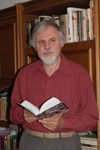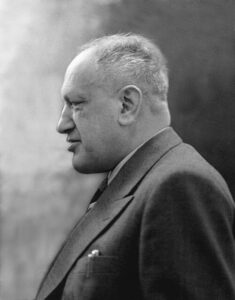In blessed memory of my teacher and friend, Professor of Physics Jan Genossar-Grunzweig (1925-2020), a Krakow native and Holocaust survivor.
By Alex Gordon


HAIFA, Israel — In 1948, Leopold Infeld’s book The Story of Évariste Galois was published in New York. Whom the Gods love. The title of the book was part of the saying of the ancient Greek comedy writer Menander, “He whom the gods love dies young.” The hero of the book died in his twenties. It was a novelized biography of the great French mathematician Evariste Galois, who died in a duel in 1832, but managed to write several pages of algebraic equations 13 hours before it, making him one of the greatest mathematicians thanks to the “Galois group,” “Galois field,” “Galois theory.”
The story of this book began in 1940 in an American town where Infeld and his friends were reliving the fall of France into the hands of the Nazis. They talked about how freedom could not die in the country that gave birth to it, recalling the freedom fighter Evariste Galois. But Infeld also remembered his homeland of Poland, which was captured by the Nazis in 1939. The author of the book on Galois was not a professional writer, but a professional physicist.
Leopold Infeld was born in Kazimierz, the Jewish ghetto of Krakow in 1898. His father was a leather merchant, and although the family lived better than many others, their living conditions were still poor. He graduated from a Jewish religious school. Leopold wanted to go to university, but his father would not allow him to attend gymnasium to prepare for university.
However, his father wanted his son to go into the family business, so he sent him to a commercial school. But when Leopold passed his matriculation exams in 1916 with very high marks, his father relented and allowed him to enter the Jagiellonian University in Krakow, where he graduated with a doctorate in 1921. He tried unsuccessfully to continue his research at the Academy of Sciences, but in 1921-30 he was only able to teach physics in Jewish secondary schools.
With the outbreak of World War I, the situation of the Jews of Poland deteriorated manifold: many men were conscripted into the army, and the open antisemitism of the regime of the Russian Empire continued unabated.
According to the Polish constitution of 1921, Jews were guaranteed a national education; discrimination on religious, racial, or national grounds was prohibited. But Jews were not granted broad cultural autonomy in the country. Even during the preparation of the 1921 constitution, Jewish parties demanded that the multinational character of the new Poland be respected. But the adopted constitution proclaimed that the new state was national.
The Polish Sejm left in force most of the discriminatory laws passed before Poland’s independence from Tsarist Russia. Since 1923, there was an unspoken numerus clausus in secondary and higher educational institutions: the number of Jewish students and high school students kept decreasing. There was discrimination against Jews in higher educational institutions, for example, there were so-called “Jewish benches” in the last rows of university auditoriums, or “bench ghetto.” Jewish employment in the public sector was limited. It was state antisemitism.
Infeld was able to become an assistant at Lvov University in the department of theoretical physics only after the regime of Józef Piłsudski abolished the discriminatory laws of tsarist Russia. But antisemitism prevailed in various circles of Polish society. In April 1934, an organization called the National Radical Camp was founded, which demanded the assimilation of Slavic minorities in Poland and the expulsion of Jews from the country. Its members beat Jews and carried out terrorist acts. In June 1934, the organization was banned, but it continued to operate underground.
Harder times for the Jews came in 1935, after the death of Piłsudski, who had kept chauvinists out of power and was building a republic of many nations. Laws explicitly directed against Jews came out of the horn of plenty. Just as in Germany, Polish antisemites, usually supporters of the National Democratic Party, picketed stores, agitating not to buy anything from Jews.
Infeld left Poland. In 1933-35 he worked at Cambridge University in England, where he collaborated with a German Jew who had fled the Nazis, future Nobel Prize winner Max Born, with whom he published papers on nonlinear electrodynamics.
In 1936, before leaving for the United States, where in 1936-38 he worked at the Institute for Advanced Study in Princeton with Albert Einstein, Infeld said goodbye to the Krakow ghetto and to his school: “I wandered through the ghetto of my city. On summer mornings, through the open window of the school, I could hear the voices of Jewish boys singing the words of the Torah in chorus. […] The windows of the school were open, the first floor windows of a dismal house. […] I saw tired, thin, poorly nourished faces with burning dark eyes and for the first time in my life I felt a touch of poetry in this sad ghetto scene.”
In USA, Infeld recalled, “I arrived at Princeton in September 1936. Five months later our collaboration with Einstein began to work out well; we understood each other perfectly and had achieved even partial success, although the problem of formulating the equations of motion was far from being completely solved. It was time to think about what would happen in the coming academic year 1937/38.
Clouds were gathering over Poland. The Society of Assistants of the Jan Kazimir University of Lvov bothered to send me a registered letter informing me that I was excluded from their circle of honor. My chances of getting a job in my home country were nil. I decided to talk to Einstein about my financial situation. […] I knew that Einstein would want to help me. But I also knew that his options were quite limited. […]”
[Einstein said]: “Under the present circumstances you should not return to Poland. We work well together, we have already achieved serious results. I would like you to stay here for another year. I think that it will not be difficult to obtain a scholarship for the next year as well.” They refused to extend the scholarship, however.
In 1938, together with Einstein and Banesh Hoffman (a Jewish immigrant from Poland, a future professor at the City University of New York), Infeld derived from the equations of the general theory of relativity equations of motion of a system of bodies in the gravitational field in an approximation higher than Newtonian. In 1938, Einstein and Infeld published the brilliant popular book The Evolution of Physics.
From 1939-50, Infeld held a professorship at the University of Toronto. In 1950 he returned to Poland, held a chair and was director of the Institute of Theoretical Physics at the University of Warsaw. In 1952 he became an academician of the Polish Academy of Sciences.
Infeld survived the Holocaust in Canada and returned to Poland, which had few Jews but a disproportionate amount of antisemitism. He was treated beautifully, but there was an anti-Jewish campaign against intellectuals in the neighboring USSR, which was felt in Poland as well.
In 1964, Infeld signed a protest by 34 leading intellectuals against government censorship. Gajewski, who was his student in Warsaw, recounted the last years of Infeld’s life: “I did not speak to Infeld about politics when he was at the height of his political power. I spoke about it near the end of his life. He was totally disillusioned with the regime, disillusioned with its policies toward science and culture, disgusted by the rabid official antisemitism.”
In March 1968, police broke up a demonstration.The Communist regime responded to the protests with an antisemitic campaign, calling Jews in high positions Zionists and enemies of Poles to blame for the government’s failures in economic and social policy, and calling for “Zionists to be sent to Zion.”
Wladyslaw Gomulka, First Secretary of the Polish United Labor Party, called them a “fifth column.” 8,300 people were expelled from the Communist Party – almost all of them Jews. Jewish emigration from Poland began. Infeld died in Warsaw on January 15, 1968. Two months after his death, a campaign of state antisemitism began. It turned out that the Polish homeland did not require the love of Jews.
*
Alex Gordon is professor emeritus of physics at the University of Haifa and at Oranim, the Academic College of Education, and the author of 11 books.